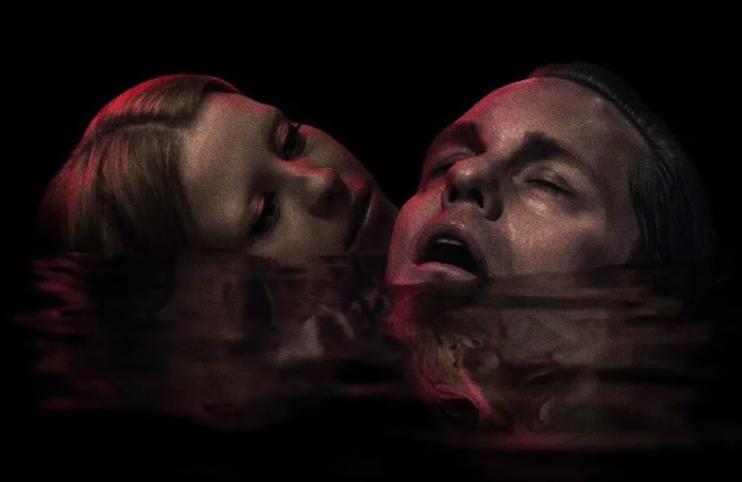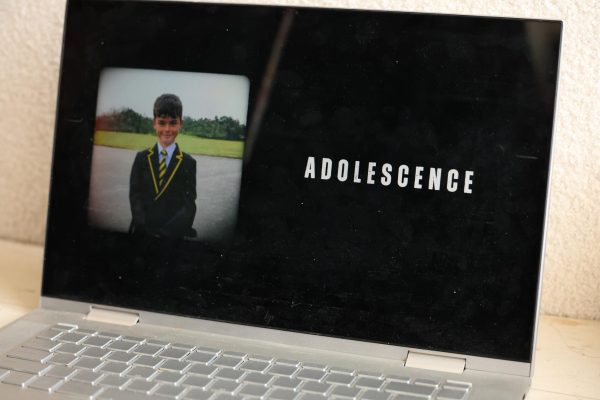The Short Fuse of Excitement in “Infinity Pool”
Brandon Cronenberg’s newest film falls lackluster during the third act in its attempts to shock audiences. (Courtesy of Instagram)
In one of this year’s first wide releases of a film from last year’s festival circuit, Brandon Cronenberg’s “Infinity Pool” finally made itself visible to public moviegoing audiences across the country. The film follows writer James Foster (Alexander Skarsgård) who, on vacation with his wife in the fictional country Latoka, falls in with the dangerously seductive Gabi (Mia Goth) and her group of wealthy tourist friends. After they end up committing an act of vehicular manslaughter, it’s revealed that the foreign justice system allows for wealthy criminals to avoid the death penalty by paying for a cloned double to stand-in during the execution. As the plot unravels in decadent sex and violence, James begins to question whether he is truly himself or just a replica of who he used to be.
While the film marketed itself as a passionate, intense film that was sure to traumatize audiences, did it manage to accomplish that goal? The answer to that question can be summed up in one of two ways: “kind of” or “not really.”
“Infinity Pool” is cursed by releasing relatively close to a recent wave of films in the past year or so that focus on critique of the hedonistic upper classes (“The Menu,” “Triangle of Sadness,” “Glass Onion” or even “White Lotus”) because the film ultimately brings nothing new to the table.
While B. Cronenberg succeeds in making his version more stylistically intriguing than similar films that came before it, it becomes clear that, by the end of the first hour, the film has played all of its cards and simply hopes that the excitement of the first hour is enough to keep the audience’s attention to the end of the runtime.
My biggest disappointment with the film is the fact that it showed its full potential for very brief moments before unnecessarily restraining itself. The first two acts feel like a set-up for a mesmerizing, avant-garde experience that you spend the entire third act waiting for and giving up on.
Like in B. Cronenberg’s two previous works, “Possessor” (2020) and “Please Speak Continuously and Describe Your Experiences as They Come to You” (2019), the body horror special effects are masterfully created and brought to the screen. The effects are visually kinetic as the gross, wet body perforations and the defiling of skin are as grotesque as ever. It is virtually guaranteed that every person who sits down to watch the movie will wince or cringe at least once during the film’s two-hour runtime. However, unlike in his two previous works, “Infinity Pool” doesn’t realize that the body horror demands to be a full meal and not the supplemental side dish to lukewarm social critique. This is ultimately the movie’s biggest problem: it is almost interesting.
The body horror is fantastic but too restrained. The social critique against upper-class neoimperialist tourists is correct but overdone. The cinematography is solid but not astounding. The script is fine. The most interesting thing the film does is provide an intriguing allegory for capital punishment and the freedom from it allowed by wealth on top of a curious philosophical discussion on identity, though even in this realm the film flounders and doesn’t reach a cohesive end goal.
It’s also entirely possible that the film was better in its original form; the film was censored from its original, unrated festival cut shown at Sundance to avoid receiving an NC-17 rating. While B. Cronenberg has stated that the edits were as minimal as possible, “trimming the violence here and there and swapping a few shots in the orgy scene” as well as removing a shot of Skarsgård’s character ejaculating in full view of the camera, the argument could be made that reducing the visual impact of these scenes waters down the thematic impact of the film as a whole. These are moments where the film is putting its best foot forward, and cutting the film down from the filmmaker’s original vision does poorly affect the film as a whole.
This isn’t to say that there isn’t a single excellent part of the film; to do so would be to neglect the film’s actors. Leading an ensemble supporting cast are the film’s two leads, Skarsgård (of the Skarsgård acting family) and Goth, who rose to popular attention following breakout performances in last year’s “X” and “Pearl” duology.
As the film’s lead, Skarsgård brings in a perfectly serviceable lead performance. As an actor with a long history of being good at his job, “Infinity Pool” doesn’t stand out as a particularly good Skarsgård performance. He knows he doesn’t need to prove himself anymore. His character plays an anxious, nervous man who falls into a spiral of mania and general debauchery, and the performance is matched pretty well.
On the other hand, it’s hard to fully buy into Goth’s performance in the film; I haven’t seen enough of Goth to make a judgment on whether or not she’s a good actress, but her performance in “Infinity Pool” isn’t the one to convince me. While she excels at the boisterous rage at her character’s core as a foil to Skarsgård, her performances in quieter moments and more sincere scenes don’t seem to carry the weight that a more intricate actor could bring. It also doesn’t help that the character she plays is given some of the weakest moments in the script, including a scene near the end where she explains the point of the movie. However, all this being said, I do think Goth’s manic energy plays to her advantage and seeing her really lean into that side of the role makes her fun.

Sebastian Diaz is a senior from Chapel Hill, N. C. who is double majoring in journalism and film. After starting as a news reporter for The Fordham Ram...













































































































































































































